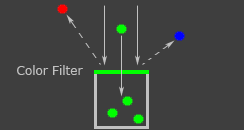If grayscale digital sensors negate the need for exotic solutions for transforming color info to black and white either in the camera or in Photoshop, why don't major camera manufacturers produce full frame grayscale sensors in a stripped down version of their SLR's?
Wouldn't it be a pleasure to shoot B&W with a simple grayscale camera, something equivalent to the M7 Leica?
Am I alone in wanting this type of camera which must be much less expensive than a full frame color digital camera?
Results 1 to 6 of 6
-
18th April 2009, 04:15 AM #1New Member

- Join Date
- Apr 2009
- Posts
- 2
Why no dedicated B&W digital sensors?
-
18th April 2009, 04:35 AM #2

- Join Date
- Dec 2008
- Location
- New Zealand
- Posts
- 17,660
- Real Name
- Have a guess :)
Re: B&W digital sensors
Hello <insert real first-name here!>

Great question ... here's my take on the answers!
First up, I don't think that grayscale digital sensors would give us any advantages in this regards; removing colour information is a trivial matter; what introduces the "exotic solutions for transforming etc" is the contrast manipulation and enhancement to make it look good, and that part wouldn't change with a grayscale sensor (ie the "art of making it look good" which bares little resemblence to the "accuracy of the capture").
To be honest, I think that such a sensor would cost a lot more to produce. Physical materials may be less, but that's only a small part of it; the seperate design and tooling etc would add up to a far greater cost due to the far fewer numbers sold.Am I alone in wanting this type of camera which must be much less expensive than a full frame color digital camera?
Just my take on it anyway
-
18th April 2009, 05:50 AM #3Administrator

- Join Date
- Apr 2008
- Location
- California, USA
- Posts
- 1,473
- Real Name
- Sean
Re: B&W digital sensors
If I understand what you're getting at here, you are talking about removing all of the fancy G-R-G-B pixels in the Bayer array, and having each pixel just capture all incoming visible light, correct?
People have been asking...if not pleading...for quite some time to have these produced The primary advantages would be (i) the simpler camera sensor circuitry and RAW processing (there really wouldn't be any), (ii) the improved noise performance due to capturing all available light (current Bayer arrays throw away up to 2/3 of incoming light at each pixel) and (iii) a slight improvement in resolution because Bayer interpolation is no longer needed.
The primary advantages would be (i) the simpler camera sensor circuitry and RAW processing (there really wouldn't be any), (ii) the improved noise performance due to capturing all available light (current Bayer arrays throw away up to 2/3 of incoming light at each pixel) and (iii) a slight improvement in resolution because Bayer interpolation is no longer needed.
However, in the battle between the specialized device and the general purpose device, the general purpose device always comes out ahead if the difference isn't enormous. That's what my take is on the Bayer versus dedicated black and white sensor issue. In practice, the advantages of dedicated prosumer B&W camera sensors have not been as large as they might seem...
Let's first take the perceived cost advantage. While B&W only sensors would greatly simplify the camera sensor circuitry, most of the cost reduction in today's cameras comes from economies of scale. In theory, I could found a start-up that would create B&W only sensors using a process which is much simpler than that required by Nikon, Canon or Sony's manufacturing processes for Bayer sensors. However, these simpler sensors would likely still not be as cheap as those from the big three, because the big three can pipeline their manufacturing due to their much higher sales volume. In order for my start-up to succeed, there would need to be enough demand for my B&W only sensors, or buyers willing to pay the necessary premium.
Ok...I might consider paying a premium if they were indeed THAT much better, so let's take a look at that aspect. First off is resolution...since there's no need for Bayer interpolation, you can conceivably gain a little here. After all, there wouldn't be demosaicing artifacts:
However, a good B&W RAW conversion can achieve a very high resolution because there IS light at every pixel location, just not full spectrum light. The seeming advantage here quickly shrinks. In fact, any advantage would be much less than the resolution advantage of a Foveon sensor compared to an equal megapixel Bayer sensor. Second, on really sharp lenses you'll run up against the problem of moire, and on softer lenses (as most will be at 20MP+), the theoretical resolution advantage will be dramatically reduced by the lens softening fine detail. After all, the linear resolution gain when going from a full frame 20MP to 30MP digital camera is at best only 22%, but in practice it can be half that depending on the lens being used. This effect will further mitigate any resolution increase.
That leaves us with noise performance. I have to grant you this one...it's probably the biggest incentive for B&W only sensors. However, noise performance on current full color digital cameras has been improving by leaps and bounds compared to film over the past 5-10 years. It's pretty stellar...so much so that it's greatly expanded the scope of photography that people can undertake. Different types of sports, street and indoor concert/theater photography that were previously unthinkable are now in the realm of two page magazine spreads. I think people are still quite impressed with this fact, and there isn't yet the push for the kind of low-light street or other photography one could do with a dedicated B&W sensor. I'm sure the demand will come though, but let's not forget...it will only really give them an improvement of circa 1-1.5 stops at the very best. After all, even dedicated B&W sensors usually have a spectrum response, so they still aren't measuring 100% of incoming visible light.
Further...Colin's answer is quite true: most of the exotic solutions that go into producing a top-notch black and white image come from the developing and "darkroom" contrast/curve enhancements. In fact, I would claim that this is the limiting factor. A dedicated B&W sensor would not affect this part of the workflow.
Ok, so I've definitely been playing the eternal pessimist thus far. I do apologize if I've attempted to burst a bubble here
I agree with you that it sure would be neat...and it will probably happen at some point (if it hasn't already). After all, actively cooled, dedicated B&W sensors have been the norm in the research field for quite some time. I just think that they're for a very specialized use, and am trying to dampen expectations a little. For many they're seen as the holy grail of B&W, when in practice the advantages just aren't what they might initially seem on paper. Personally, I like retaining full color information even when I'm out only thinking of B&W shots . . . just in case.
Oh, and welcome to the forums! Great question/thread. Look forward to many more.Last edited by McQ; 18th April 2009 at 06:10 PM.
-
18th April 2009, 09:01 AM #4
Re: B&W digital sensors
Hi Sean,
So are these the kind of sensors used in say lab/forensic micro/macroscopes; the ones where you can vary the wavelength of the illumination source to filter different responses from the subject (e.g. in inks and fibres)?
Hi pho68,
If you get a chance, could you post an intro about yourself in the Introduce Yourself & Welcome Other Members (2) thread, many thanks
Dave
-
18th April 2009, 03:08 PM #5New Member

- Join Date
- Apr 2009
- Posts
- 2
Re: Why no dedicated B&W digital sensors?
Thanks especially to MCQ for the quick and thoughtful reply to my question about B&W digital sensors. I have been shooting film for more than 40 years, and have lately come to deeply appreciate the qualities-or lack thereof- of high speed B&W film such as Ilford Delta 3200. I have used it in low light and daylight. I was hoping to find a digital equivalent, but can see that sticking with film seems the best way to go.
I am 68 years-old and have been a working photographer and teacher of photography since 1968. Lately I have posted 250 photographs spanning the years 1969-2003 on my facebook site. If you'd like to see the work, please become my "friend".
-
18th April 2009, 05:13 PM #6Administrator

- Join Date
- Apr 2008
- Location
- California, USA
- Posts
- 1,473
- Real Name
- Sean

 Helpful Posts:
Helpful Posts: 
 Reply With Quote
Reply With Quote





